Buy stocks. Bet on growth. Beat the bond market.
Investors aren't likely to have heard those words uttered for quite a while. But wealth managers seem convinced that the time is right to plunge back into the stock market.
But is it?
The sluggish economic prospects of the past four years have now faded from view in the United States, China is making a soft landing and there are faint signs of an end to Europe's sovereign debt crisis. Reasons enough for some investors to feel optimistic, says Johannes Jooste, the head of strategy for Europe, the Middle East and Africa at Bank of America Merrill Lynch.
But that doesn't mean investors are snapping.
"In Europe and the US, our investor base is very conservative post the crisis, overweight in fixed income," he says. "A typical problem we face is coaxing someone out of fixed income and back into equities."
But given that many investors still bear the "scar tissue" of the crisis, as Goldman Sachs' sinister turn of phrase memorably put it, it is worth wondering how long those stock investors who got their fingers burnt will remain wary of equity markets.
After all, if wealth managers are so keen on selling equities to us, it is worth thinking about why they are selling equities in the first place.
Stocks could quite easily receive a clobbering if the US congress fails to reach a compromise over the so-called fiscal cliff. Going over the edge could disrupt growth in the world's biggest economy by about 4.6 per cent, according to estimates from the IMF.
But wealth managers are increasingly warning that bond markets may be past their prime.
Fixed income tends to perform better during tough economic times because bondholders get their money back before shareholders in the event of a company's liquidation. That gives bonds a veneer of safety compared to stocks.
Successive announcements of additional bond-buying programmes by the US Federal Reserve, European Central Bank and the Bank of Japan have contributed towards a flattening of yields first on highly rated sovereign debts, then investment grade corporate credit. (Bond yields move in the opposite direction from prices.)
But as high-yield debts - or "junk bonds" - start to show yields tightening too, many are getting twitchy.
With few opportunities left in sovereign bonds in developed markets following recent rallies, investment grade bonds offer only selective opportunities, says David Pinkerton, the chief investment officer at Falcon Private Bank.
"We still believe there are going to be continued capital flows into the global emerging market bond space," he says. "The key is if superior yield is going to continue on a global scale."
Strong demand for bonds from central banks has pushed sovereign bonds in developed markets to below prevailing rates of inflation. But this has also been the case in Abu Dhabi and Qatar, where local companies backed by regional governments are benefiting from some of the lowest borrowing costs in years.
"To date bond holders have been very well supported by a hesitant recovery in the economy and massive purchases of bonds by the Federal Reserve," wrote Gary Dugan,the chief investment officer for Asia and the Middle East at Coutts.
"We don't expect any change in strategy, however the market may increasingly fret over how the Fed is going to slowly extract itself from the very accommodating support it is providing the economy and the bond market."
As yields dwindle, there are few options available for investors.
One workaround is more leverage, to turbocharge returns on so-called "safe assets".
Given the thirst for yield, many investors need to be dissuaded from taking excessive leverage beyond what is prudent, says Paolo Moscovici, the head of Middle East and emerging markets at JPMorgan Private Bank.
For most banks, this is a message that was rammed home during the financial crisis.
"Prudent leverage saved us in 2008," he says. "None of our private clients had situations where they were overleveraged. That's the worst possible situation where a private client can be."
A highly leveraged portfolio, for all the yield benefits it may bring, may not look so attractive when stress-tested against the kind of market meltdown seen during the past few years, Mr Moscovici adds.
Another alternative is to return to equities, but Mr Pinkerton says this currently has little appeal for the average investor.
In recent years, asset managers recommended holding high-yielding dividend stocks in defensive sectors such as telecoms and utilities.
The theory was that these equities were the most bond-like, because of their consistent dividend payouts, but with a dash of risk to provide a little extra potential return.
In a sign of the changed times, they are now recommending growth stocks.
Inflation might seem to be dead, but Mr Jooste says it is really in "hibernation". And nothing will turn the bond market bearish faster than a prolonged bout of inflation.





